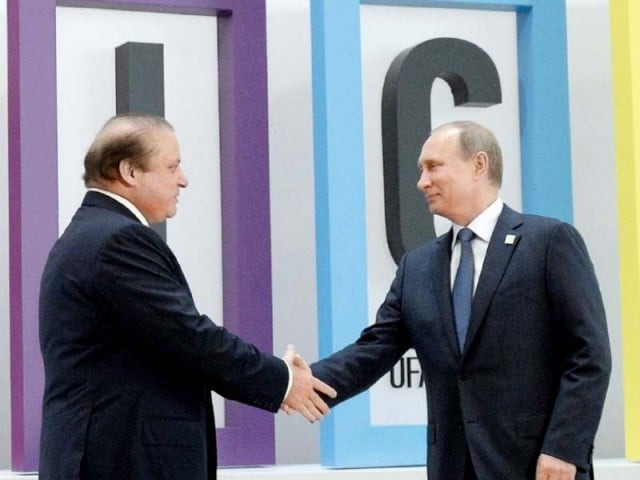Foreign policy stumbles
Russian President Vladimir Putin has decided to refuse the invitation to visit Pakistan

Russian President Vladimir Putin greets PM Nawaz Sharif on his arrival at the 7th BRICS summit. PHOTO: PID

The collapse began with the attack on the Indian airbase at Pathankot that skewered the bilateral talks that were about to move to the foreign secretary level. There were efforts to keep the talks on track and as recently as last week, there were ‘contacts’ between the two sides but the talks are effectively dead in the water, killed off by a group that has a base in Pakistan. It is that failure by the state to control or even regulate extremist and terrorist groups that has been the stiletto through the ribs for our nascent foreign policy shifts, and the rot does not stop there. As previously noted in these columns, American lawmakers are far from happy with the obvious and continuing presence and capacity of Taliban groups to operate from Pakistan; so irritated are they that the latest F16 purchase has run into the sand and Pakistan is going to have to find $700 million because the US Congress refuses to use American taxpayers’ money to fund the deal.
To cap four months of foreign policy discomfort, Russian President Vladimir Putin has decided to refuse the invitation to visit Pakistan in what is the diplomatic equivalent of a mighty slap in the face. Russia is not a country that is to the fore in terms of protecting the human rights of its citizenry and has its own problems with extremist groups, Muslim and otherwise — to say nothing of its interventionist positions in the Middle East and Ukraine. A state already the subject of sanctions in the wider world yet disdainful of an invitation by Pakistan. The reasons for declining the visit are somewhat opaque but Russia is believed to be less than delighted — as are any number of other states — with the persistence, indeed proliferation, of extremist groups within our borders. Russia has considerable potential for Pakistan as a trading partner, but citing insufficient “substance” to Mr Putin’s trip as the reason to refuse the invitation, which in diplomatic terms is almost unparalleled as invitations such as this are only given after the back-channel work has been done — is virtually unprecedented.
Pakistan keeps snakes in the back garden. They are not fussy about who they bite. When they bite other states around us or those with which we have economic or cultural ties, then unsurprisingly those states want to know why our snakes have bitten them and what we are doing about not letting it happen again. Snakes are never friendly. They cannot be tamed or domesticated though they can be defanged and rendered harmless but have to be caught first. They bit foreign policy. Unfortunately, nobody had bothered to remove their fangs.
Published in The Express Tribune, May 2nd, 2016.
Like Opinion & Editorial on Facebook, follow @ETOpEd on Twitter to receive all updates on all our daily pieces.















COMMENTS
Comments are moderated and generally will be posted if they are on-topic and not abusive.
For more information, please see our Comments FAQ